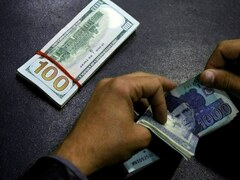A couple of months ago when foreign flows started pouring in the country and the reserves jumped from a low of $8 billion to reach $14 billion in just five months, there were talks of a possible early exit from the IMF’s extended facility.
The pain in the neck for Finance Minister Ishaq Dar were those stiff targets of net international reserves having adjustors against the money that came from KSA ($1.5bn), Eurobond ($2bn) and so on and so forth.
However, as much as Dar would have liked it, it would not have been a wise decision to abruptly come out of the fund’s programme, despite the fact that balance-of-payment risks have substantially subsided for the time being. The sustainability of improvement in economic and financial outlook of the country is contingent upon the IMF’s nod. That is imperative for materializing the aggressive plans of privatization and shares offloading of state owned entities. The government has budgeted Rs198bn ($2bn) from privatization in FY15 and privatization commission is confident of selling nine discos to private hands by December 2015.
In addition, funds from other multilateral donors will be dubious; about $10 billion is projected to come at extremely concessionary rates from the World Bank in the next five years and some of this money would remain elusive if we don’t comply with the IMF. Similar is the story with Asian Development Fund and other multilateral agencies.
The idea of all those financial and economic support is to instill structural reforms and, apart from direct contribution, efforts are directed to facilitate foreign investment in the power and other infrastructure. This can crowd in the domestic investment and generate a much required economic momentum.
With the mindset of sticking to the fund’s programme, economic managers of the country including new Governor SBP were able to negotiate on the NIR and fiscal deficit targets. “The Board also approved the authorities’ request for a waiver of non-observance of the end-March performance criterion on the ceiling of the net domestic assets of the State Bank of Pakistan, as well as modifications to adjust the end-June performance criterion on the net international reserves target and the end-June fiscal deficit target,” highlighted the IMF’s press release on successful completion of third review.
The fourth IMF tranche of $556 million has been transferred to the State Bank of Pakistan last week. Although the country report has not been prepared yet, chances are that given better reserves position a few of adjustors in setting NIR targets will be modified to incorporate goodies coming from left, right and centre.
The fund has stressed to evaluate the impact of these flows on inflation—demand pull inflation amidst cost push threats from possibility of higher oil prices. “The policy interest rate should be set so as to bring inflation down over time,” the IMF said.
IMF has acknowledged the improvement in macroeconomic conditions but emphasized that continued efforts are required to safeguard fragile economic recovery. Dar and his team shall have the acumen and political writ to do meaningful work on broadening the tax base. They shall ‘do more’ than ad-hoc measures; higher incidence of indirect taxation on non-filers and increased collection of direct taxes in indirect mode should be done away with.
Nonetheless, good efforts in the process eliminating tax concessions and exemptions are right steps for a fairer and simple tax system and may help in discouraging the culture of rent seeking. Much more is needed to be done on this front.
The most important element for building an economic momentum is to address the energy bottlenecks. There has to be concentrated efforts on not only administrative reforms in distribution and enhancing the power generation capacity but should also spend adequate resources on improving transmission system, as according to Federal Minister of power our existing system cannot sustain more than 15,000MW.
Hopefully, Mohammad Zubair and his team will be successful in privatizing nine Discos in eighteen months time with the condition of requisite investment in transmission infrastructure as well. All these reforms are contingent upon the government to complete its term seamlessly, when in fact the political clouds are dark. Keep your fingers crossed.
BR100
12,154
Increased By
88.7 (0.74%)
BR30
35,868
Increased By
101.3 (0.28%)
KSE100
114,872
Increased By
808.3 (0.71%)
KSE30
35,267
Increased By
233.5 (0.67%)



















Comments
Comments are closed.